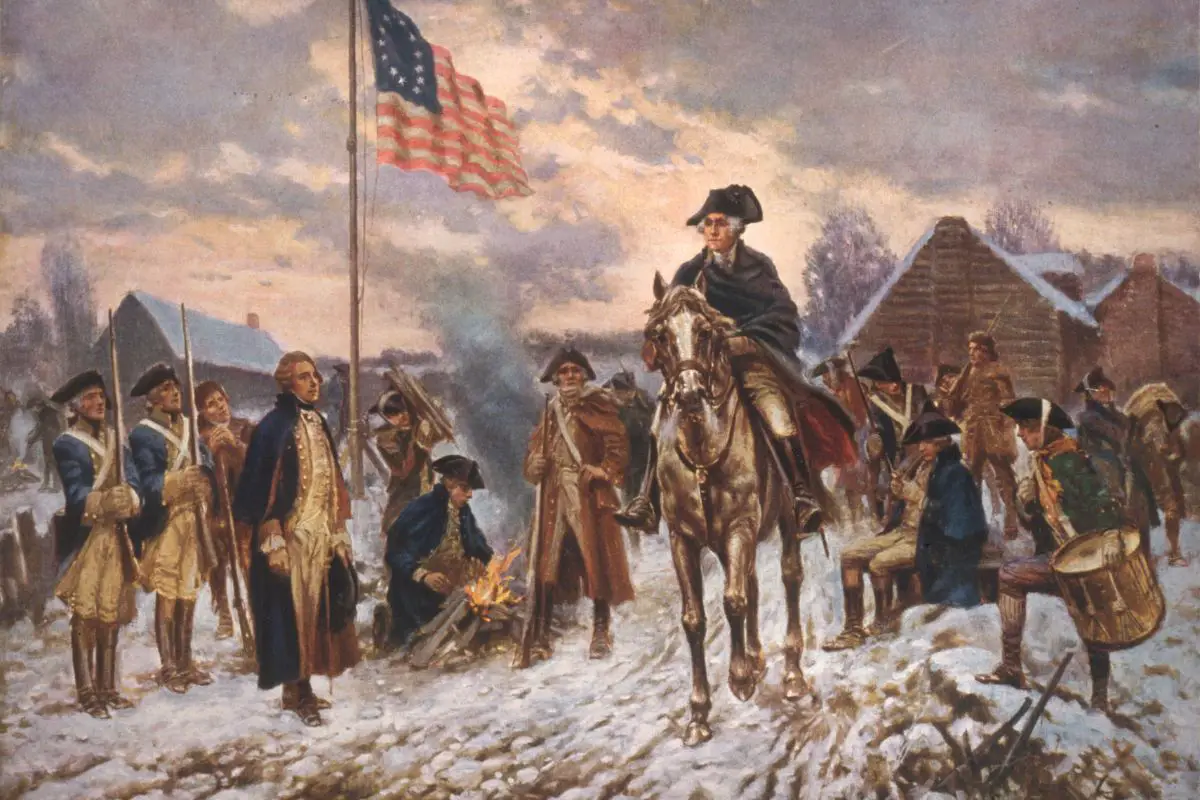Revolutions have to start somewhere, and in the case of the American Revolutionary War, most would argue that it all started right here in New Hampshire!
With anti-British sentiment seething in the public consciousness, even before there were any outright conflicts between the colonies and the crown, New Hampshire was the spark that ignited a furious fire that would eventually lead to independence.
While it’s true that no revolutionary warfare actually played out on New Hampshire soil, this state and its free-thinking leaders and population were strong advocates for independence, doing everything possible to support the movement.
So, without further ado, let’s put New Hampshire’s contribution to the American War of Independence under the microscope, and celebrate this nation’s proud history!
The First Stirrings Of Discontent
Believe it or not, a lot of the very first anti-British sentiment bubbling in the background of 1700s New Hampshire was the result of a tax on white pine trees imposed by the crown. These trees were felled and claimed by the King in order to build ships for his Navy.
Considering standard taxes had already shot through the roof to support the British in a war against their old enemy France, it’s understandable that tensions were beginning to reach boiling point.
Although the revolution was a few years off yet, this tree tax sparked what could be considered one of the very first notable rebellions against the British in the colonies.
It took the form of the Pine Tree Riot during which numerous townspeople attacked the loyalist sheriff and deputy with tree switches and maimed their horses in protest of the British monopoly on New Hampshire resources.
This may have been a rather minor event in the grand scheme of history, but it served as a test of British rule, proving that the crown was not infallible, thereby opening up doors to resistance across the nation, perhaps most notably, in Boston with the Boston Tea Party.
This second act of opposition to British rule is widely considered the first significant flouting of the crown and is thought to have ultimately led to the true beginnings of the American Revolution.
Now, the Pine Tree Riot wasn’t the only minor rebellion against the British around this time, but it was one of the most notable, so it’s not too much of a stretch to say that the revolution, at least in part, started right here on New Hampshire soil.
Fanning The Flames Of Revolution
Although the claiming of New Hampshire timber was a big point of contention for certain members of New Hampshire’s population, this was just one of three things that rallied the people to support the revolution.
Word of the Boston Patriot movement was getting around, and in the wake of the tax situation across the colonies, the dissenting ethos of this movement was starting to gain traction in New Hampshire.
It let people know that their discontent with the British was not simply localized to New Hampshire alone, meaning the chance that something could eventually be done to distance America from the British was growing increasingly likely.
The second revolutionary instigator came from within the colony itself, in the form of the loyalist Wentworth family who had tyrannically dominated governance of New Hampshire over the course of numerous generations.
The Wentworths constantly put the colony second after British interests, and the general population was sick of it, even if they weren’t entirely in favor of all-out revolution.

First To Arms
All accounted for, we understand the American Revolution to have started in 1965, but only in the hearts and minds of those who thought it the only logical way forward.
It would be some time until any armed combat took place; however, when the time came to bear arms, New Hampshire was the first to do so.
It all started with a failed patriot attempt to steal arms from Fort William and Mary via deception.
Shortly after this initial effort proved unsuccessful, John Langdon stomped the streets of Portsmouth with a drummer in tow, requesting the men rise up and storm the fort. Hundreds took to his side and made their way to the castle via the Piscataqua River.
Though there were only 6 caretakers guarding the fort, they refused to stand down, so the mob descended on the structure in the face of musket and cannon fire.
After making ground on the guards, the combatants engaged in hand-to-hand combat for a time before the defenders were overrun and subdued.
The New Hampshire militia robbed the fort of 100 gunpowder barrels and tore down the British flag, letting out three victorious cheers as they did so. Several men were wounded during this raid considered the very first armed conflict of the Revolution, but no wounds were fatal.
The British would call for aid in Boston and would eventually take the fort back without a fight, leading to the royalist Governor of New Hampshire seeking refuge in the castle protected by the Royal Navy for a significant period.
Yet, the stolen gunpowder was never returned, and in the end, was used against the British in clashes such as the Siege of Boston and the Battle of Bunker Hill.
First To Independence
New Hampshire was so sick of British tyranny that leaders of the colony decided enough was enough and drafted an independent constitution, officially declaring it a free territory, completely dislocated from British rule. Six months later, the Declaration of Independence would legitimize the revolution on behalf of all 13 colonies.
Revolution In Full Swing
As mentioned earlier, no battles of the Revolutionary War were fought on New Hampshire soil, but that didn’t stop the New Hampshire military from seeking out the fight elsewhere!
New Hampshire troops were captained by the state’s most esteemed military leader, one Mr. John Stark, and both he and his soldiers went on to play pivotal roles in nearly every major Revolutionary conflict. Most notably, the New Hampshire military galvanized combined state forces during the Battle of Bennington and the Battle of Bunker Hill.
But it wasn’t just willing soldiers that New Hampshire provided. It became one of the premier naval engineering hubs in America, helping patriots take the fight for independence to the seas.
The Revolution And Public Opinion In New Hampshire
Considering the details discussed above, you’d be forgiven for assuming that the majority of the New Hampshire population was pro-revolution, but this wasn’t the case at all.
Roughly one-third of the colony was made up of loyalists staunchly opposed to rebellion, while another third were on the fence, not sure which eventuality would be best for America, the colony, and the individuals within it.
That leaves just a third of the population in support of the revolution, but they were passionate enough to have a massive impact on events as the revolution gradually unfolded.
Final Thoughts
History would look very different today had New Hampshire not been such a proud and brave colony willing to put everything on the line for the betterment of what would become the United States of America.
Granted, the revolution was inevitable, but there’s no doubt that the actions of New Hampshire expedited the fight for independence, rallying other states to do what they could to end British Tyranny.



